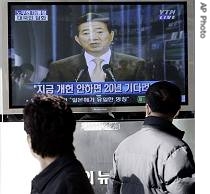-
(单词翻译:双击或拖选)
By Kurt Achin
Seoul
11 January 2007
South Korean President Roh Moo-hyun has gone on live television for the second time in three days to promote his constitutional proposal on changing the length of presidential terms. Although he says he will not resign the presidency1 early over the issue, he says he is willing to break from his own political party if it will help overcome opposition2. VOA's Kurt Achin reports from Seoul.
In a voice resonant3 with emotion, President Roh Moo-hyun defended a proposal he had unveiled two days earlier for changing the length of time a South Korean president serves.

People at a waiting room of Seoul train station watch President Roh Moo-hyun deliver a speech, 9 Jan 2007
Mr. Roh says he will consider quitting his Uri political party if it will help overcome opposition to his revision proposal.
Later Thursday, however, he dismissed speculation4 that he would resign office over the issue.
Mr. Roh's proposed change would allow future presidents to serve up to two four-year terms, instead of the single five-year term the constitution currently allows. He says the present moment offers the best opportunity to start a dialogue, because campaigns for presidential and legislative5 elections will begin soon, and will stretch over the next year and a half.
Just hours before the president's televised news conference, his second one this week, leaders of South Korea's four largest opposition parties boycotted6 a scheduled luncheon7 meeting at which he was to explain the proposal to them.
Mr. Roh lambasted the main opposition Grand National Party, or GNP, Thursday for imposing8 what he described as a "gag order" on the democratic process.
He says the GNP's refusal to engage in debate on the issue is similar to a rejection9 of democracy itself.
Mr. Roh's approval ratings hover10 at around 10 percent, amid widespread perception that he has mishandled security and economic issues. Political experts say his offer to quit the Uri Party holds little value, since most key members of the party are already expected to desert him next month to form a new political faction11.
GNP spokeswoman Na Kyong-won suggests the president's insistence12 on the issue's urgency is an attempt to revive his own prestige before leaving the presidency.
She calls on Mr. Roh to cease immediately what she calls his politically motivated discussion of the issue.
Former GNP Chairwoman Park Geun-hae, widely seen as a leading candidate to replace Mr. Roh when his term expires in early 2008, says the country cannot afford to open the debate at this time.
She says starting the debate now will draw too many political resources away from other issues of public importance.
Recent polls show many South Koreans support the basic idea of reforming the constitution. Mr. Roh's opponents, however, say the time to begin the process is after next December's presidential election.
 收听单词发音
收听单词发音
1
presidency

|
|
| n.总统(校长,总经理)的职位(任期) | |
参考例句: |
|
|
|
2
opposition

|
|
| n.反对,敌对 | |
参考例句: |
|
|
|
3
resonant

|
|
| adj.(声音)洪亮的,共鸣的 | |
参考例句: |
|
|
|
4
speculation

|
|
| n.思索,沉思;猜测;投机 | |
参考例句: |
|
|
|
5
legislative

|
|
| n.立法机构,立法权;adj.立法的,有立法权的 | |
参考例句: |
|
|
|
6
boycotted

|
|
| 抵制,拒绝参加( boycott的过去式和过去分词 ) | |
参考例句: |
|
|
|
7
luncheon

|
|
| n.午宴,午餐,便宴 | |
参考例句: |
|
|
|
8
imposing

|
|
| adj.使人难忘的,壮丽的,堂皇的,雄伟的 | |
参考例句: |
|
|
|
9
rejection

|
|
| n.拒绝,被拒,抛弃,被弃 | |
参考例句: |
|
|
|
10
hover

|
|
| vi.翱翔,盘旋;徘徊;彷徨,犹豫 | |
参考例句: |
|
|
|
11
faction

|
|
| n.宗派,小集团;派别;派系斗争 | |
参考例句: |
|
|
|
12
insistence

|
|
| n.坚持;强调;坚决主张 | |
参考例句: |
|
|
|















